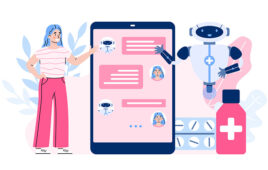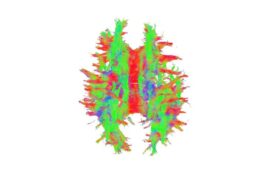
(Image by Rishi Deep on Unsplash)
The electronic medical record was designed to better track patient care, but it has had unintended consequences. Physicians are bombarded with digital patient information all day long, reducing their patient eye-to-eye interactions and adding hours to their workday.
A 2016 American Medical Association study found that physicians spent about two hours on electronic health record and other desk work per day for every hour that they provide direct clinical face-time to patients. Outside office hours, physicians spend another one to two hours of personal time each night doing additional computer and other clerical work, the study found.
Medical device companies realize that the data deluge has brought on doctors’ daily dread. Boston Scientific (NYSE:BSX) is trying to make better and more meaningful use of the data its devices generate for physicians, patients and caregivers, according to David Feygin, the company’s chief digital officer.
Physicians are asking for insight versus broad data, for automation as opposed to manual data entry, for tools that help them make optimal decisions without taking their decision authority away, Feygin said. Even the most advanced artificial intelligence can’t replace a human with a medical degree.
Boston Scientific recently began to apply its HeartLogic algorithm to data that its Latitude remote monitoring system gathers from patients who have new cardiac-assist devices implanted. Data generated by these pacemakers and defibrillators can alert healthcare providers to the potential for heart failure “multiple weeks out” so they can intervene, Feygin told Medical Design & Outsourcing in an interview.
The HeartLogic diagnostic is designed to provide continuous monitoring of possible heart failure by combining sensors tracking heart sounds, respiration rate and volume, thoracic impedance, heart rate and activity, according to the Marlborough, Mass.-based company.
“That data is so incredibly powerful and if we could release that data and leverage it across the ecosystem, we could do tremendous good,” Feygin said.
Boston Scientific is also working on designing software applications to make healthcare staff’s lives easier and their work more efficient. These applications would reveal how care is being delivered, expose inefficiencies and suboptimal care, particularly at what Feygin termed “the boundaries” of patient care, between hospital and home, among hospital, care facility and home, and between physician and patient.
Medtech companies also have to figure out how individual patients accept and react to all the data that their implanted and wearable devices generate, according to Feygin, who has been with Boston Scientific for 2-1/2 years. He maintains that patients’ response to digital health data is poorly understood and defined.
“Our role is to restore faith in digital health,” Feygin said. “This is the Gen. 2.0 of digital… Success in this space is going to be about how quickly you can learn and how quickly you can respond.”




